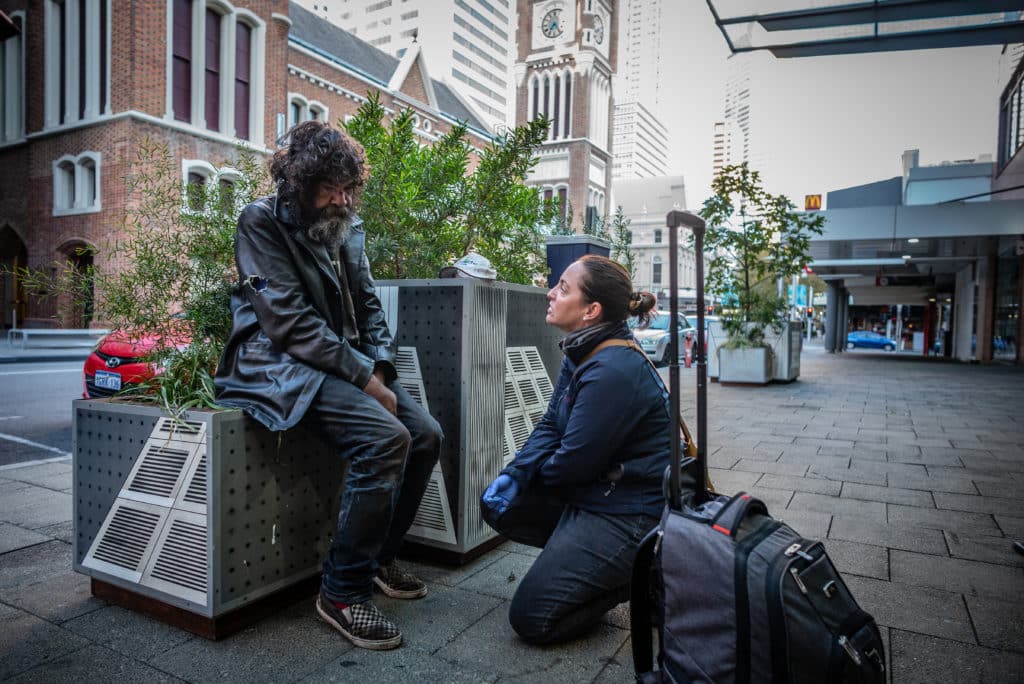Homeless Healthcare seeks support for the Together Program to provide additional assertive outreach nursing care to pregnant women who are experiencing homelessness. The Together Program aims to provide stability during pregnancy and for the first two years of a newborn’s life. The Program will support up to 10 mothers and their babies to improve physical and psychological health, ensure mothers maintain the care of their babies and provide a pathway to longer term housing.
Requested Amount: $49,795 from a total project cost of $255,000
100 Women funds have been requested to cover additional nursing hours for the pilot program to adequately cater for the complex needs and support required by the women and their babies.
Who is the organisation and what is their mission?
Homeless Healthcare aims to advance and promote the health of people who are experiencing homelessness and marginalisation. Homeless Healthcare does this effectively by working collaboratively with local social services. Homeless Healthcare’s mission is,
to be leading health experts providing patient-centred care and advocacy for people experiencing homelessness.
Homeless Healthcare was established in 2008 with two, half-day drop-in clinics. Since then, the organisation has grown significantly and in the year 2021/22, Homeless Healthcare provided 33,000 consultations to people who are experiencing, or at risk, of homelessness.

What is the project that the 100 Women grant will support?
The Together Program is a collaboration between UnitingWA and Homeless Healthcare, supporting pregnant women in Perth, who are experiencing homelessness. UnitingWA will provide intensive wrap-around case management and housing and Homeless Healthcare will provide medical support. Funding from 100 Women will enable Homeless Healthcare to provide additional nursing hours to ensure these women receive the medical care required for their complex needs.
A Homeless Healthcare Street Outreach Nurse will identify the women for the Program and they will be provided with an apartment through UnitingWA for 9 to 12 months. Homeless Healthcare will provide regular ongoing GP appointments, nursing home visits (daily if required), breast/bottle feeding support, assistance with Child Health Nurse services and referrals to any additional services required. At the end of this period, the women will be referred to long term community housing priority pathways.
Who is the project for? Who else will benefit?
The direct beneficiaries of this program are up to 10 Perth mothers and their 10 babies who are currently experiencing homelessness.
Why is the project needed?
The lack of housing in Australia is considered a national crisis. According to the 2021 census, the estimates are that over 120,000 people in Australia are homeless, including pregnant women. Recent hospital data for around 7,500 people who have been or are homeless in Perth indicates that 248 women had pregnancy-related hospital presentations between 2020 and 2022.
Often pregnant women who are experiencing homelessness will not engage with medical services for fear of Child Protection and Family Services being notified, and in turn, babies being removed at the hospital and taken into care. This Program aims to keep mother and baby together and provide stability and medical support to ensure better health and life outcomes for both mother and baby.
What are the planned outcomes for the project?
The Program aims to ensure mothers retain access to their babies and to improve both the physical and mental health of the mother and baby. It is anticipated there will be improvements in growth and development of the baby and improved parenting capacity of the mother. It is planned that participants will experience greater stability through successfully transferring to longer term housing, as well as a greater connection to the community, better quality of life and improved wellbeing. The Program aims to improve the first 1,000 days of a baby’s life, in which research has shown to have significant, life-long outcomes. The three-year pilot program will be evaluated by the University of Notre Dame’s Home to Health research team.


